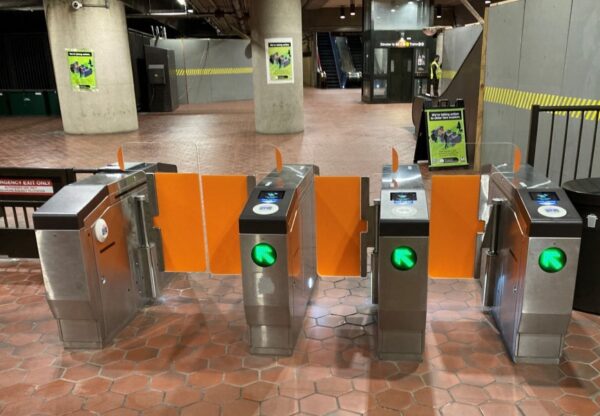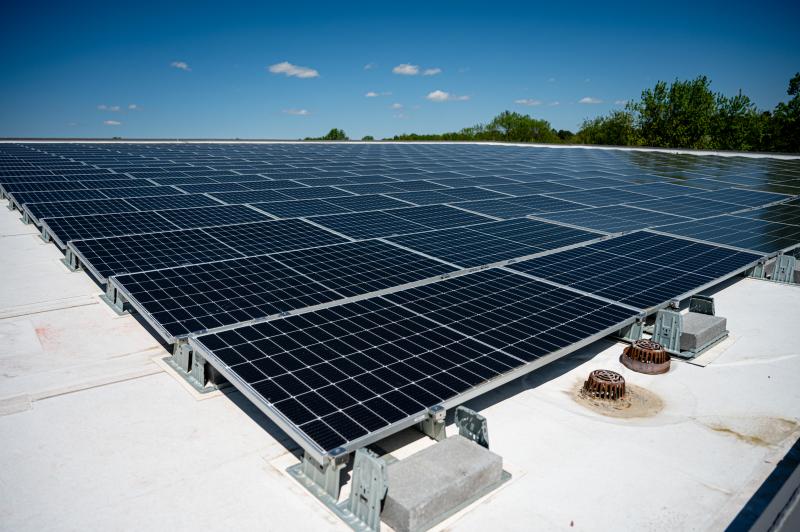
Saloon-style doors are coming to the Vienna Metro station’s fare gates.
The Orange Line terminus is one of nine stations in the first phase of Metro’s fare gate retrofits, which will install taller, glass doors on all of the transit agency’s recently modernized gates to deter people from jumping over to avoid paying to ride the rails.
The first phase will focus on stations with only one entrance and, therefore, fewer gates, Washington Metropolitan Area Transit Authority officials told the Board of Directors on Thursday (March 23).
Other stations in the first phase include Court House and Pentagon City in Arlington; Federal Center Southwest, Congress Heights, Mount Vernon Square and Fort Totten in D.C.; and Bethesda, Wheaton and Addison Road in Maryland.
“We have done some work to determine that the infrastructure needs to do the retrofits are minimal, a way for the team to learn and progress as they’re installing these retrofits,” WMATA Chief Planning and Performance Officer Tom Webster said.
Metro began testing doors aimed at preventing fare evasion last November at the Fort Totten station, including a design with “anti-vaulting arches” that proved ineffective.
The pilot launched before the agency had even finished outfitting all stations with their first updated fare gates since the 1990s, a process that lasted from 2021 to this past December. Though Metro estimated in 2019 that fare evasion was costing it $10 million, board members didn’t want gates that evoked cages like the ones in New York City, according to DCist.
However, reducing fare evasion has emerged as a top priority for WMATA General Manager and CEO Randy Clarke since he took over the job in July.
The new gates have sensors that register all users, regardless of whether they tap their SmarTrip card to pay, giving WMATA more accurate data on rail ridership, Webster said.
So far this year, Metro has seen about 22.3 million rail users, averaging 324,000 trips on weekdays, and the roughly 404,000 trips recorded on Wednesday (March 22) represent the system’s highest single-day ridership of the pandemic, Webster reported at the board meeting.
Metro’s new data indicates that approximately 13% of those total riders didn’t pay at the fare gate. While acknowledging that riders may not be paying for a variety of reasons, including college and D.C. students who can ride for free, the agency says fare evasion affects both its finances and its optics.
“Non-payment of fares reduces Metro’s revenue and ultimately impacts our budget, which can impact service for all customers,” Webster said. “There are also broader concerns with fare evasion in terms of a sense and perception of safety and security and this sense of disorder associated with fare-jumping.”
Metro is facing a $185 million budget shortfall that could widen to as much as $730 million next year, after the agency’s federal Covid relief funds run out. To close the gap for fiscal year 2024, which begins July 1, Clarke has proposed a budget that increases fares by 5% on average, adding 50 cents to the current $6 maximum.
WMATA estimates the fare gate retrofits will cost $35 to $40 million — money that some argue would be better spent in other ways.
Call me crazy, but I would rather my tax dollars go towards letting people who can’t afford transit ride free than on imposing consequences on people who can’t afford to ride transit. This is a waste of money @wmata. https://t.co/oUoKKeQO5i
— Alison Horn (@AlisonHornDC) March 20, 2023
The proposed FY 2024 budget includes a program to cut train and bus fares in half for low-income riders — similar to what Fairfax County has done for Fairfax Connector. The plan also eliminates peak fares and aims to improve rail service times.
A Maryland representative on the board suggested Metro wait three to six months after the Fort Totten station fare gates are fully retrofitted — a process finished this weekend — before rolling out the new doors to other stations.
Clarke said the agency is committed to implementing the new doors system-wide, noting that purchase orders for the equipment have already been issued and the installations are underway.
“I wouldn’t label this as a pilot. I would look at this as this is what we’re doing moving forward,” he said.
Metro didn’t respond to FFXnow’s query about the Vienna station timeline, but the full rollout is expected to take about 15 months.
Recent Stories

The Gillion Academy’s Home School Basketball Program begins Fall 2024 for 7th – 12th Grade student-athletes to complete their online academic studies in a supervised and focused setting while receiving elite training from our professional basketball trainers at The Gillion Basketball Academy, a state of the art training facility in Springfield, Va. We have developed over 200 college athletes and placed over 50 players in the NBA and pro leagues overseas and provide the same level of training for our student-athletes.
We will have a virtual Open House Zoom on May 6th at 7:30PM so please go to our website to learn more about us and to fill out an interest form and register for the event and learn about the top training facility in the DMV area.
Any questions please email our Director at philip.budwick@gil-lionbasketballacademy.com.

For many remote workers, a messy home is distracting.
You’re getting pulled into meetings, and your unread emails keep ticking up. But you can’t focus because pet hair tumbleweeds keep floating across the floor, your desk has a fine layer of dust and you keep your video off in meetings so no one sees the chaos behind you.
It’s no secret a dirty home is distracting and even adds stress to your life. And who has the energy to clean after work? That’s why it’s smart to enlist the help of professionals, like Well-Paid Maids.
Pedal with Petals Family Bike Ride
Join us on Saturday, May 11th and ride into spring during our Pedal with Petals Family Bike Ride. Back for its second year, Pedal with Petals is going to be bigger than ever. This year’s event will include both an
Encore Creativity for Older Adults at Capital One Hall
Encore Creativity for Older Adults is pleased to raise the curtain and welcome community members to its spring concert at Capital One Hall in Tysons, VA on May 4, 2024. The concert, which starts at 3 PM, will bring hundreds







